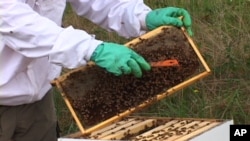"The Secret Life of Bees" may be the title of a popular book, but as it turns out, a bee's life is not so secret after all.
The scientists at a military research facility just outside Washington, D.C., have figured out quite a bit about honeybees, and they have discovered clues into what may cause colony collapse disorder - where hives have few, if any, adult honey bees present, but the live queen remains.
Alan Zulich, with the U.S. Army Edgewood Chemical-Biological Center in Maryland, says, "We have found in our samples that colonies that are collapsing have both the invertebrate iridescent virus and the fungus associated with it."
Using some very sophisticated equipment, Zulich says the researchers at Edgewood have been able to identify the microorganisms in bee samples from all over the country.
"You can tell that you have a lot of this microorganism present," says Edgewood researcher Rabih Jaffour, "while the one next to it, there's nothing unique to that protein."
Another Edgewood researcher, Samir Deshpande, says these calculations take a matter of minutes, despite comparing data from thousands of possibilities.
"This all started in 2000, when the human genome sequencing was done," says Deshpande. "And since then, over 3-thousand genome sequences have a label now, viruses and bacteria together."
Alan Zulich says the research team was able to identify two organisms that were associated with every sample they received from collapsed colonies - a virus coupled with a fungus. But he says it is difficult to determine if they are the cause of the colony collapse, or the effects of something else in the environment. That "something else," could be several things, says Galen Dively, of the University of Maryland.
"The working hypothesis is that we have several primary stresses, (one of which is) nutrition, because bees are being used on crops that have very low nutritional value. There's management stress because they're moved around. There's pesticide exposure, we're learning more about that. We have mites that came into this country in the mid-1980s. They are very stressful to bees. So you have all these primary stresses on the bee's immune system, which weakens the colony, and then there are the secondary stresses like viruses and other diseases."
And the news gets worse for the bees. Dively says there are other problems facing honeybees besides colony collapse disorder.
"If you survey beekeepers across the country and get their honest feedback, the number one cause of die-outs is still going to be starvation. So we just have to manage them better. And we're losing beekeepers too. That's one of the problems."
That's a big problem for agriculture, especially for the pollination of fruits and nuts. Marc Hoffman is a beekeeper for an apple orchard near Washington, D.C.
"Many crops depend on insect pollination," he says, "and with our intensive agriculture, it needs to be honeybees, because we can bring them to the crops."
The honey that bees make is just the icing on the cake. Hoffman says the main value of honeybees is for pollination. Without bee pollination, California's almond crop, for example, would be non-existent. "In China, in one area where they killed all of their insects through pesticide use," says Hoffman. "They have 30-thousand young women pollinating their orchards. I don't think we want that here."
And that's why Alan Zulich says finding the cause and cure to honeybee diseases like colony collapse disorder is so important.
"We've identified the organisms, other organizations look into how to deal with that," he says. "But once you've identified the organisms that are associated with it, you have a way to deal with the organisms. Like any virus, the iridescent virus is difficult to treat. However, there are ways to treat the associated fungus, there are ways to change the environment. For instance, this usually happens in a cold, cooler climate. So if you warm up the colony a little bit, it would help alleviate some of the problems."
Beekeeping dates back to ancient Egypt. But this ancient art, on which agriculture is so dependent, may now need to rely on some high-tech calculations for its survival.
